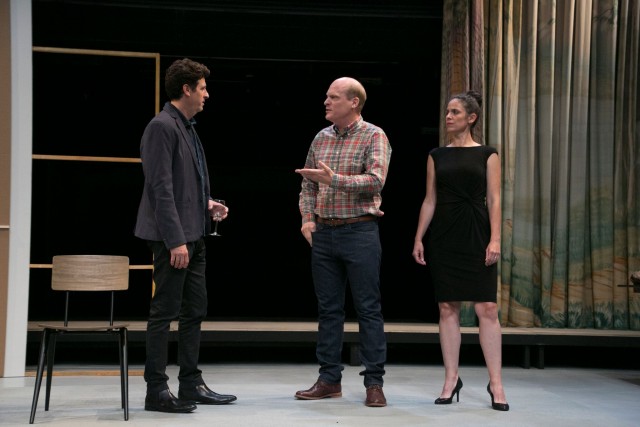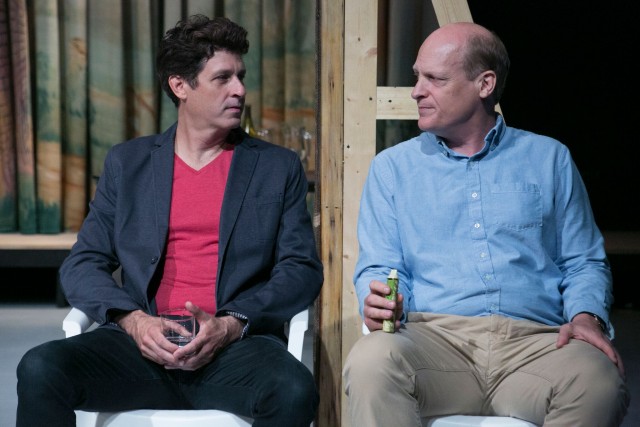
Massimo (Gary Wilmes), Patrick (Jim Fletcher), and Isolde (Tory Vazquez) discuss function and beauty, love and memory in splendidly constructed Richard Maxwell play (photo by Gerry Goodstein)
Theatre for a New Audience, Polonsky Shakespeare Center
262 Ashland Pl. between Lafayette Ave. & Fulton St.
Tuesday – Sunday through September 27, $55-$100
866-811-4111
www.tfana.org
Writer-director Richard Maxwell uses the construction of a Jungian dream house as a sharp metaphor for the building of a play in his latest experimental work, Isolde. Hyperrealism, surrealism, psychobabble, inside jokes, and the occasional cliché combine to form a grounded though existential narrative that has a lot to say about life, love, and the theater. As the play begins, Isolde (Tory Vazquez), a popular actress, is running lines with her husband, Patrick (Jim Fletcher), a successful contractor. She is rehearsing for a role in a play based on the legend of Tristan and Isolde, but she gets frustrated when she keeps losing her place. “Should we start from the top?” Patrick says? “No, no! I can get it,” she replies. “OK. . . . Um. Isolde. To get the line . . . Did you ever just try saying what you feel?” Patrick asks. He’s worried about her mental health, but she’s concerned about a lot more than that. “It’s getting worse!” she declares. Her career might be in jeopardy, but she is energized by Massimo (Gary Wilmes), the “artist architect” she has hired to design their latest vacation house. Massimo’s method involves getting to know his clients very well before deciding what to build, which in this case includes growing a little too close to Isolde. They discuss function and beauty, home and memory, while Patrick, a practical realist, becomes more and more concerned that Massimo, a poetic fantasist, isn’t really doing anything, so he brings in his friend Uncle Jerry (Brian Mendes), a gruff construction worker, for his opinion. Massimo and Uncle Jerry lock horns almost instantly, their differing styles at odds. As the three men watch football and bicker among themselves, Isolde gets right to the point. “Imagine knowing something is missing and not knowing what that is. That dresser, that doorway. That tree, that face. That thought. The panic of it not being there,” she tells Massimo with Shakespearean grace. “Wait till you see it gone and the terror of one day not even knowing that it’s gone — how do you mourn that which you cannot recall? You’re only left with the ghost of some longing, a deadened sensation of the void. How subtle is the gift of memory? How precious?”

Massimo (Gary Wilmes) and Patrick (Jim Fletcher) both have their hands full in ISOLDE (photo by Gerry Goodstein)
Isolde takes place on Sacha Van Riel’s somewhat spare set, with exposed, movable plywood walls and a far-off image of the lake they are building near, as if the play’s setting is as unfinished as Massimo’s design. There are numerous bits of dialogue that refer to the making of theater as much as the construction of a house. “Where is the flow? Should you have two stories?” Massimo asks. “This is my cue?” Patrick says, adding, “Can we see a budget?” Maxwell also takes a wry stab at how he perhaps has been perceived as an avant-garde theater director, as Massimo explains: “People often get the wrong impression about me. They think I’m this laid back guy and I am but that doesn’t mean I don’t know what I’m doing. The truth is some of my ideas are not always embraced. And I’ll be the first to tell you I come across as arrogant, but I see my peers bumble through the orthodoxy of architecture and I want to be impressed with their work but I’m not impressed.” Fletcher (House of Dance, And That’s How the Rent Gets Paid), Vazquez (People without History, Wrestling Ladies), and Wilmes (Chinglish, Straight White Men) are joys to watch, so at ease with one another; veterans of Maxwell’s New York City Players company, they also portrayed characters immersed in a love triangle in Gatz, Elevator Repair Service’s eight-hour adaptation of Fitzgerald’s The Great Gatsby. To further the various meta surrounding the multilayered show, Maxwell is married to Vazquez and went to high school with Wilmes. As with nearly all of Maxwell’s productions (Neutral Hero, House, The Evening), the terrific actors — including Mendes, who offers a refreshing honesty and bluntness as Uncle Jerry — recite their often abstruse, disconnected dialogue plainly and directly, without overt emotion, almost robotic at times, although their performances are filled with passion. Artists of many disciplines are often compared to architects, and, of course, vice versa; in the eighty-five-minute Isolde, at Theatre for a New Audience’s Polonsky Shakespeare Center in Fort Greene through September 27, Maxwell lifts the concept to a whole new level, or should we say story. “Function is beauty; it takes us out of the past, answers the future,” Isolde says to Massimo early on. “Don’t erect a monument just to hold on to something.” In Maxwell’s world, function is indeed beauty, and he builds works that are much more than mere monuments.